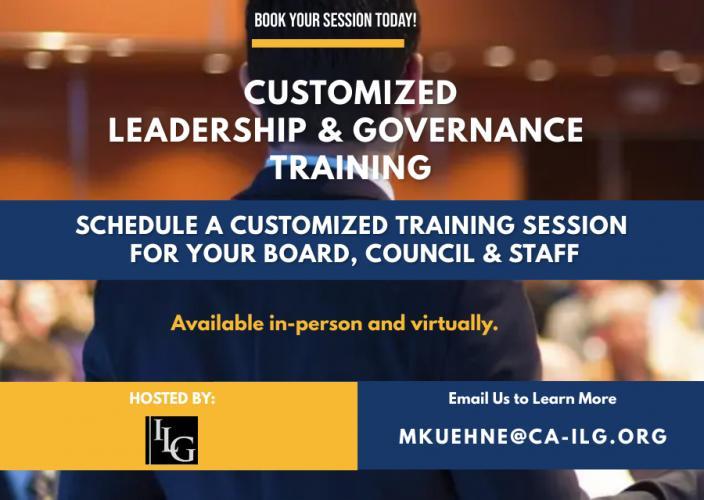
California’s local governments face myriad of challenges from
housing and homelessness, to climate, budget shortfalls and
aging infrastructure. Elected leaders and staff cannot
effectively address these challenges without a strong foundation
of good government – trust, accountability,
responsiveness and transparency. ILG’s Leadership &
Governance pillar helps local government leaders build that
foundation, develop leadership skills, operate with civility and
decorum and increase public trust.
ILG’s Leadership & Governance team is customizing
in-person Leadership & Governance workshops for local
government jurisdictions statewide. These sessions are available
upon request and include intensive training for government bodies
looking to expand their leadership skills. The offerings are
specifically tailored for local county boards of
supervisors, city councils and agencies as well as
their staff and cover a wide range of topics including the
following.
For questions or to schedule a briefing please email
Melissa Kuehne at mkuehne@ca-ilg.org.
Effective Councils and Boards
Leading public organizations and governing with colleagues on a
board is a challenging art of community service and many
aspects of leadership and governance are not intuitive. This
session provides elected officials and executive staff with
insight into the attributes of effective boards and councils
as well as provides practical tips to help them become
exceptional. Topics include:
- Developing a sense of team
- Having clear roles and responsibilities
- Honoring the relationship with staff and each other
- Conducting effective meetings
- Holding themselves and the agency accountable
- Practicing continuous learning and development
Goal Setting/Strategic Planning
Local governments are continuously being asked to do more with
less, while also managing over two years of crisis response. This
has resulted in local leaders grappling with increased pressure,
burnout and fatigue on top of the ongoing challenges of
effectively and efficiently running our cities. Strategic
planning and goals setting are tools that can help local
governments navigate ongoing challenges and emerging
needs. Goal setting is important because it provides a
sense of direction and outlines measurable goals to guide
decision making about which community priorities warrant an
agency’s limited resources. These goals can also provide a
framework for reporting/tracking progress for your executive team
and staff and can inform an evaluation process as well as
the annual budgeting cycle. This session will guide local
government officials and staff through a goal setting/planning
process that will set the agency up to track, measure and report
progress on strategic goals and priorities.
Civility in Public Meetings
Local governments across the state are experiencing increased
vitriol, polarization and disruptions at their public meetings.
Local officials and staff alike are eager to find policies,
practices and other tools to manage public meetings that balance
local governments’ ability to conduct effective meetings while
also ensuring the public’s right to participate and desire to be
heard. This training covers communication strategies, governance
policies and other resources to help promote civil discourse,
encourage effective meetings and navigate disruptions.
Governance Tools: Policy Handbooks and Codes of Conduct, Ethics
and/or Civility Policies
A governance handbook is a document that outlines the norms,
protocols and operating principles of the council. It is not a
rule book or a code of conduct book, although those items may be
included. It is a comprehensive document that outlines the
behavior and expectations of the council as a whole and provides
guidance on how the council will hold itself accountable by
individual members and to the public. This session will walk the
leadership team through exercises to review, revise and/or adopt
policies including: a Governance Handbook/Policy Manual, Code of
Conduct, Ethics Code or Civility Policy.
Building Trust through Public Engagement
Authentic public engagement is a cornerstone of building trust in
our communities. By proactively engaging their communities, local
governments can build better relationships, educate community
members, ease project implementation and
ultimately build trust with the public. This session will
provide tips and strategies to work with non-profits and
community-based organizations, craft messages that focus on
community values and meet language access and
accessibility needs.
Roles and Responsibilities
Exceptional boards and councils understand their role is to serve
as policy maker – to represent the values, beliefs and priorities
of their community while serving in the community’s best
interest. They carry out a variety of responsibilities including:
developing and adopting a vision for the agency; focusing and
aligning plans, policies, agreements and budgets in furtherance
of this vision; and holding themselves and executive
staff accountable for results. This session discusses the
distinction between the roles and responsibilities of the
governing body as a whole, the individual elected/appointed
official and executive staff.
Team Building
In successful agencies elected officials and executive staff
work as a team as they undertake a series of tasks to further
their common purpose. The individual team members work in a
coordinated and collaborative manner with a high degree of
respect, trust and openness. The team values diversity in style
and perspective. The team thinks and acts strategically as it
examines issues/situations and decides on a course of action
serving their agency’s mission and goals. In this session,
elected officials and staff will get to know each
other; how each person approaches issues, decision making style;
and how to best work together.
Communicating for Success
Includes the participant assessing their own style and receiving
feedback from others on how their communications are received
using the Success Signals© instrument. By comparing
the two results, learning more about the various styles of
communication, and reflecting on the people with whom they work
most closely, the results of the exercises create the opportunity
for the individual and the team to enhance their skills and
flexibility in how they communicate with others to gain greater
results. We also explore the concept of framing an idea based on
the audience for maximum results.
 Menu
Menu

